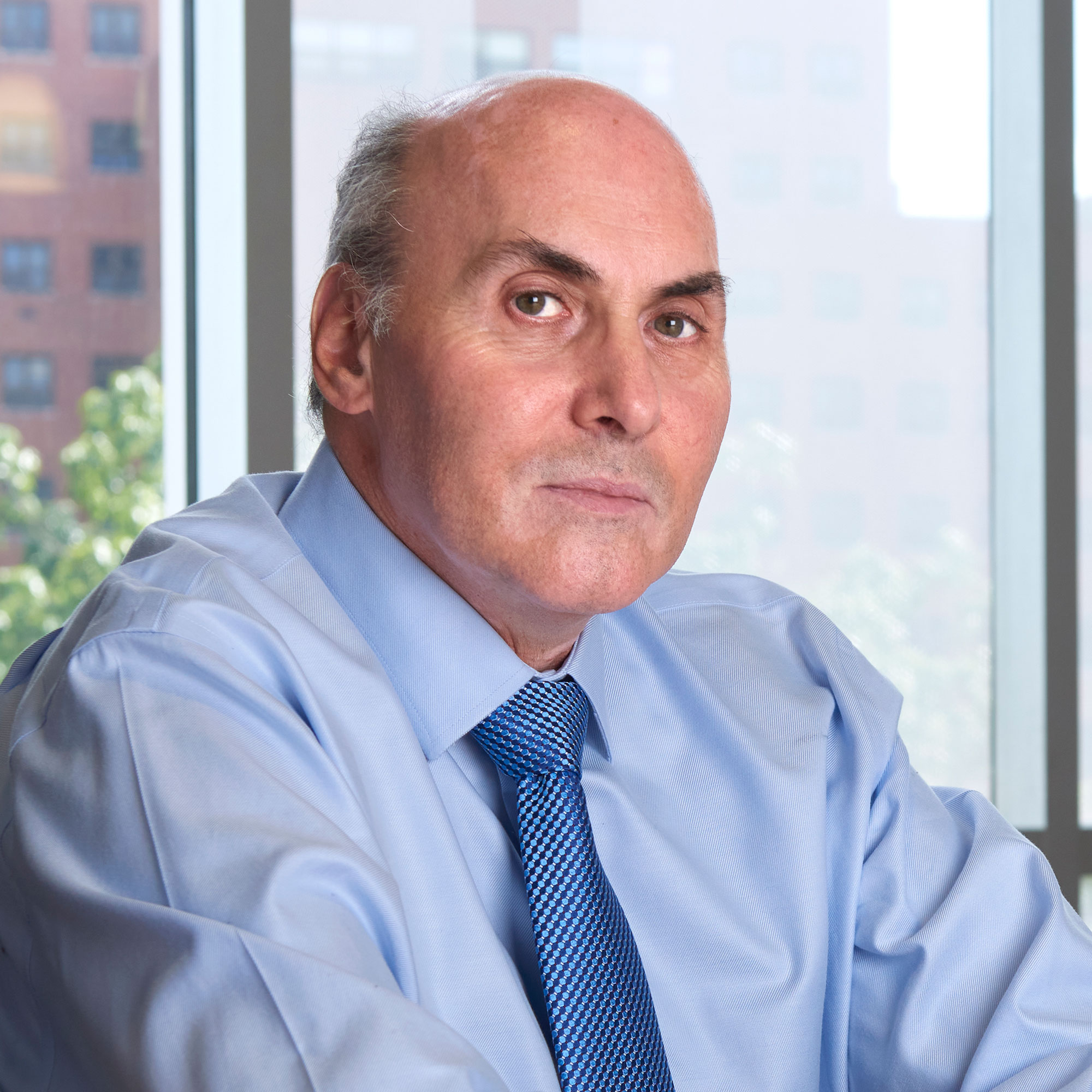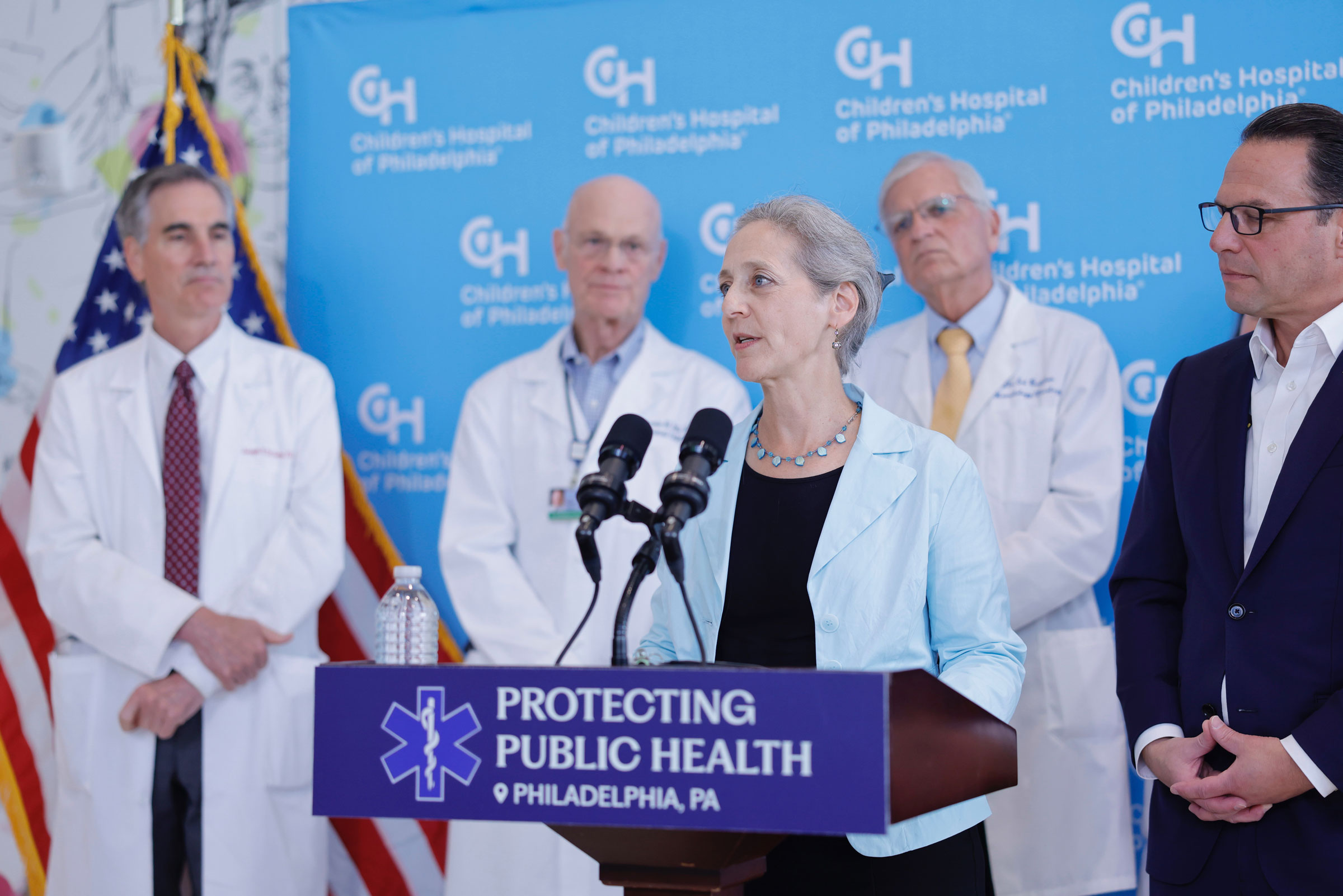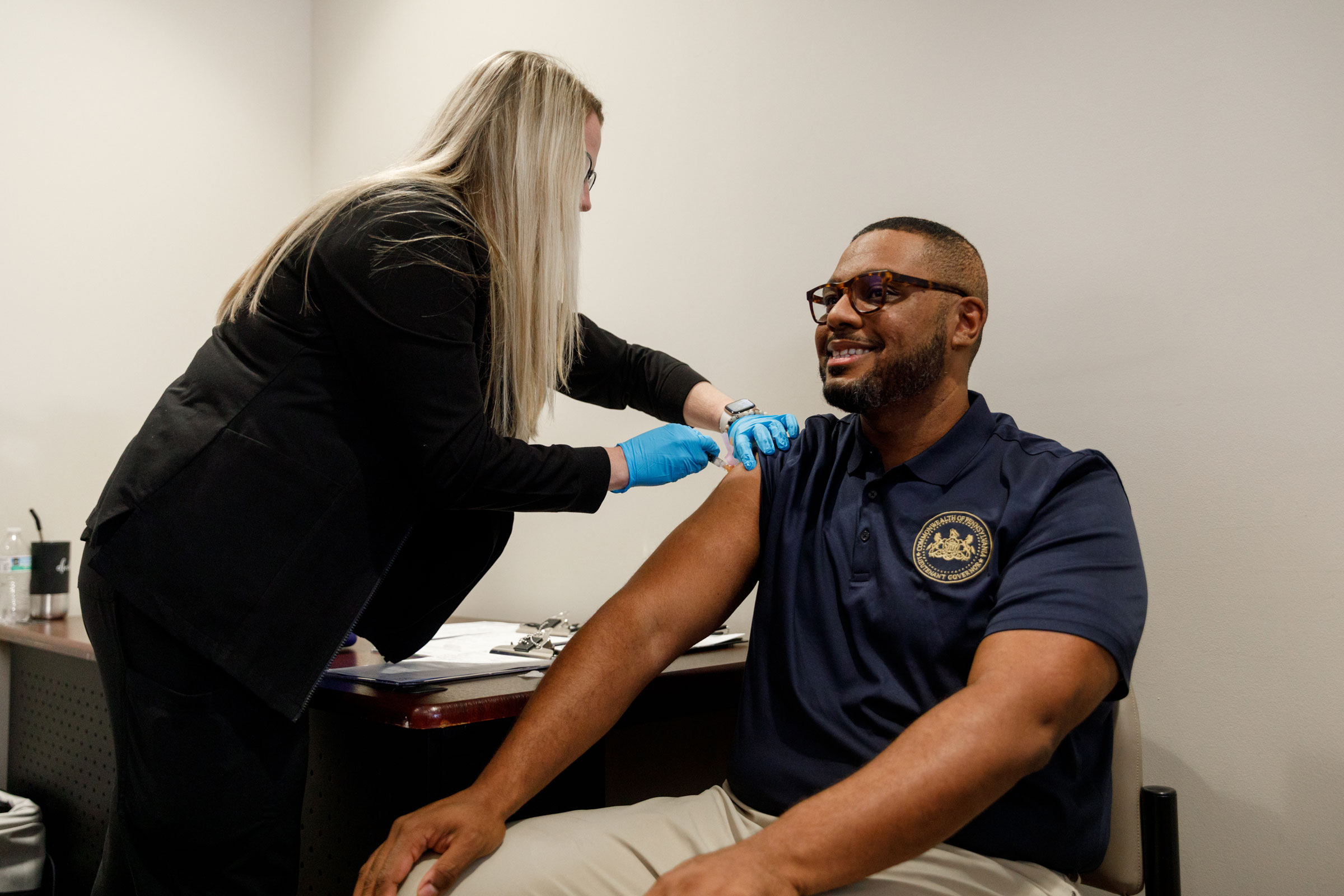Interviews & Profiles
Ask The Experts: Philadelphia’s imperiled research ecosystem
Amid federal defunding of scientific research and radical shifts in vaccine and health policy, City & State surveyed Philadelphia’s top vaccine experts to discuss what’s at stake.

The Trump administration, led by HHS Secretary Robert F. Kennedy Jr., has drastically changed vaccine infrastructure. Jabin Botsford/The Washington Post via Getty Images
American medical research – and vaccine innovation in particular – have been shaken to their core by President Donald Trump and his administration’s dramatic defunding of scientific research, coupled with U.S. Health & Human Services Secretary Robert F. Kennedy Jr.’s radical makeover of public health policy, including the wholesale dismissal of medical experts from federal advisory panels.
At that core is Philadelphia – a city whose legacy of vaccine innovation includes the development of most of today’s most significant, lifespan-extending immunizations. In the decades since World War II, scientists at the University of Pennsylvania, the Children’s Hospital of Philadelphia and the Wistar Institute have pioneered game-changing vaccines against such erstwhile scourges as rubella and rotavirus, as well as more recent threats like COVID-19.
The government funding that sustained that legacy – along with Philadelphia’s mighty biomedical research ecosystem – is now a thing of the past, threatening the region’s future as a global magnet for talent and a burgeoning incubation hub for biotechnology. Meanwhile, as federal policy winnows the availability and promotion of routine vaccinations, diseases long relegated to history books, like measles and chickenpox, are making a resurgence.
Amid this bleak landscape, City & State gathered three of Philadelphia’s most prominent vaccine and public health experts to discuss what’s at stake – and what policymakers can do about it. They are Dr. Drew Weissman, director of the Penn Institute for RNA Innovation and the 2023 Nobel laureate in medicine for co-creating MRNA vaccine technology; Dr. Paul Offit, a pediatrician who co-created the 2006 rotavirus vaccine, co-directs the Vaccine Education Center at the Children’s Hospital of Philadelphia and, until RFK Jr. dismissed him last month, was a longtime fixture on the U.S. Food and Drug Administration’s Vaccines Advisory Committee; and Charlotte Moser, Offit’s CHOP VEC co-director, who in June was dismissed, along with the other 16 longstanding members, from the U.S. Centers for Disease Control and Prevention’s Advisory Committee on Immunization Practices, known as ACIP (the administration has eliminated a full third of CDC’s workforce).
This interview has been edited and condensed for clarity.
How have you been impacted professionally, as well as personally, by the administration’s public health-related actions?
Charlotte Moser: We’re all much busier thinking about how to get good information out to the public – a lot of the information coming out from the highest levels is now misinformation or disinformation.
Paul Offit: When the Advisory Committee on Immunization Practices, or what we’re calling the Advisory Committee on Immunization Practices, meets and says the next outrageous thing – or Trump or RFK Jr. says the next outrageous thing – I’ll get five to 10 media calls a day. Every day it seems like there’s something new.
Between CNN and MSNBC, I was on television six times last week. And you feel like it’s your responsibility to do that, because you want to try and right the wrongs – but it’s like trying to get a sip of water from a fire hose.
Drew Weissman: We’ve had our COVID-19 grants cut. We’ve had our universal coronavirus grants cut. We were told our HIV grants are not going to be renewed, that the government no longer has interest in that. That RNA for respiratory viruses is no longer a government interest. RNA in general is not an interest of our government anymore.
What’s at stake with this disinvestment?
DW: The clinical trials are lining up. A couple months ago, there was a report on an RNA vaccine preventing pancreatic cancer (which is almost invariably fatal) in a quarter of the people. And another similar (successful vaccine trial) with melanoma, which is also deadly.

There are gene therapies – CHOP had one with a child who was going to die at a very young age, but is now out of the hospital and appears completely healthy. People with amyloidosis (a fatal multi-organ disease) who would have died and are now cured.
These therapies are already working in people. There’s a new therapy that appears to cure lupus and other autoimmune diseases. The list really goes on and on.
And what happens to breakthroughs that are in clinical trials and actually saving lives?
DW: It’s my one-word answer: China. All of this research goes overseas because the U.S. has lost interest in it. The rest of the world has not.

In addition to the economic losses, what are the downsides to relying on China for medical breakthroughs?
DW: China is not an open society in the way that the U.S. has traditionally been in terms of transparency or access. Just imagine the next pandemic: We’ll be going over to China to ask them for the vaccine that they developed.
PO: We’re going to pay a price for this. It’ll take us a while to see how big that price is. And China was not a good friend at the beginning of this pandemic. They weren’t very quick to let international teams of scientists come in and see what was going on. Do you really want to rely on them?
How do you think Philadelphia’s storied health innovation ecosystem and its ‘brand’ as a life sciences hub will be impacted by government disinvestment?
PO: Just look at The Wistar Institute and Children’s Hospital of Philadelphia: They were the primary drivers for the invention of the rubella vaccine, the rotavirus vaccine, the work on anthrax vaccine, the rabies vaccine…that’s all here. Maurice Hilleman, who worked at Merck (in Montgomery County) and later became a pediatrics professor at Penn, conducted the primary research and development of nine of the 14 vaccines currently administered to infants and young children.
However, if you speak with the manufacturers now, they’re hesitant about where to go with vaccines. We generate – not a big market product, but certainly a big, impactful product. There are statistics about what this country gets for every research dollar spent, and it’s tremendous. So to cut it back is very shortsighted, and we’re going to feel the pain of this.
DW: Our president has talked about bringing manufacturing back to the United States. So it’s confusing that they’ve taken such an anti-science approach: Science was our best manufacturing sector. The United States has limited manufacturing; where we’ve been best in this country has been innovation.
RNA vaccines, RNA therapies – all of that started in the United States, and we were the leaders around the world. That’s been effectively killed: The United States is rapidly falling behind China and the rest of the world.

CM: There’s going to be an impact in this region because of all of the universities and science-related research – but that’s happening across the country. What is worrisome beyond this moment is how many kids will not go into the sciences or the medical field because of this situation.
DW: Penn cut a third of all graduate students. Just about every university has cut similar numbers – so it’s that many fewer who are coming into the field. We also have the financial penalties and the uncertainty about the administration targeting high-profile universities.
In the sciences, we have these NIH research cuts – dramatic defunding. They’re also working to actively reduce NIH training grants and other training grants. So they’re trying to gut universities from both the top and the bottom.
Is it harder to attract and retain talent? Have colleagues opted to go elsewhere? Are labs being shut down?
DW: All of those things. A lot of our young people who were considering jobs in the U.S. are now going to Europe and Asia. I get phone calls from Asia, from the Nordic countries, telling me about the billions of dollars they have available to hire away my young people. And more are going to be leaving as we go along.
PO: Dr. Stanley Plotkin (the renowned vaccinologist, now emeritus professor of pediatrics at Penn, best known for developing the rubella vaccine at Philadelphia’s Wistar Institute) gave a talk at a national meeting recently. He thinks that, whereas this country has been the primary site of research and development for vaccines, that’s going to move to India and China – they’re going to be the big winners here.
DW: China is already ahead of us. I have a friend who started an RNA company in China to make vaccines and therapeutics; he received a billion dollars from the Chinese government to start his company. In the U.S., we beg for a couple million dollars as a seed round to start a company.
And arguably the biggest vaccine manufacturer in the world is the Serum Institute of India.

Paul and Charlotte, you’re part of a team advising Gov. Josh Shapiro on public health and vaccine policy. What are your thoughts on the growing alternative movement of public health officials joining to issue guidance in response to a federal system they no longer see as a reliable source?
CM: We’re in a position where these kinds of alternative strategies have no choice but to form. We’re certainly talking to Gov. Shapiro’s office, and they’re talking to the Northeast Public Health Collaborative (a coalition of six states, including Pennsylvania). We’ve had a West Coast consortium, and the Vaccine Integrity Project out of the University of Minnesota, which pulled together some of the professional organizations and tried to at least ensure that we’re getting data around vaccine recommendations.
But I think we’re going to be limited in how successful that kind of a patchwork approach can be, because nobody individually has the resources the federal government had or has. Some of the concern is related to surveillance – the loss of understanding of what disease spread looks like in this country. If we can’t get that from the government – or if we can’t trust what we get from the government – that’s awful.
PO: It used to be you had a central source – the CDC, which was the principal public health agency in the world, providing data to the ACIP, where a group of experts would then review and make recommendations based on good data.
But two former CDC directors, Rochelle Walensky and Tom Frieden, said you can’t trust the CDC anymore. And you certainly can’t trust what is euphemistically called the ACIP – a group that reflects RFK Jr.’s anti-vaccine, anti-science bias. They’re a clown show.
Therefore, people are stepping forward. The American Academy of Pediatrics now has its own vaccine schedule. It’s going to make good medical practices and work with insurance companies to make sure they’re covered.
But it’s fragmented. Whether it’s the states or whether it’s these professional societies, it’s fragmented, which will be confusing.
It seems like just one more instance of the fragmentation we increasingly see in our society – in media, in culture.
CM: But there’s no fragmentation on these pathogens. They don’t care what state you live in. They don’t care what your politics are – and therein lies our problem.
What are your fears for the future – and your hopes?
DW: Many of the blue states are trying to improve things. Many of the red states are trying to make it worse. We have Florida getting rid of vaccine mandates, a bunch of other red states working on getting rid of vaccine mandates. That is going to kill more children than anything they’ve done so far, between the measles that keeps spreading, whooping cough, tetanus and the preventable diseases.
If you look at stats, 250 years ago, 40% of our kids never became adults. Nowadays, that number is 4% across the world. That’s mainly because of vaccines. Vaccines have saved more lives than any other medical treatment – and we’re losing that.
My fear is that nowadays, you go to your travel doc when you’re going somewhere and they say, ‘Oh, you need a yellow fever shot.’ Pretty soon, travel docs across the world are going to say, ‘You’re from the United States? Show me documentation of all of these vaccines, or we won’t let you in.’ We’re going to be a Third World country for travel.

PO: I’m choosing to be optimistic. But I’m an Eagles and Phillies fan, so you probably shouldn’t go by me.
(Regarding Trump’s and RFK Jr.’s allegations that Tylenol causes autism), I think the OBGYN folks and the physicians largely have rejected that. When Trump goes through his whole rants – much by the media certainly is going to be ignored by the professionals and ignored, I think, ultimately, by the public.
I do think we’re going to pay a price in the short term for this, but science is on our side. That is a powerful thing to have on our side. RFK Jr. can say over and over again that vaccines cause autism, which he’s going to be doing – and ultimately that will be shown to be wrong, and I think it will therefore be ultimately rejected.
CM: There’s a small group of people on social media who make an idea very popular, when in fact, it’s very minor. Data shows that 80% of people (across both parties) still support vaccines.
But unfortunately, when traditional media are covering the nonsense that happens on social media, that’s where we start to lose traction. We need to keep the lines of communication open with people – and healthcare providers in particular need to keep having those conversations.
I really am trying to be a glass-half-full person. We have nothing right now but the hope that the pendulum is going to swing back – that it’s just a matter of how many of these diseases people need to see before they realize that we are not each other’s enemy, it’s these pathogens that are the enemy, and that we really need to be a team and fight these pathogens again. I’m holding on to that.
